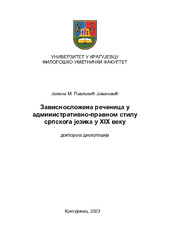Приказ основних података о дисертацији
Zavisnosložena rečenica u administrativno-pravnom stilu srpskoga jezika u XIX veku
The subordinate clause in the 19th century Serbian legal language
| dc.contributor.advisor | Kovačević, Miloš | |
| dc.contributor.other | Milanović, Aleksandar | |
| dc.contributor.other | Polomac, Vladimir | |
| dc.contributor.other | Petković, Jelena | |
| dc.creator | Pavlović, Jelena | |
| dc.date.accessioned | 2024-02-14T15:26:49Z | |
| dc.date.available | 2024-02-14T15:26:49Z | |
| dc.date.issued | 2023 | |
| dc.identifier.uri | http://eteze.kg.ac.rs/application/showtheses?thesesId=8684 | |
| dc.identifier.uri | https://fedorakg.kg.ac.rs/fedora/get/o:1643/bdef:Content/download | |
| dc.identifier.uri | https://nardus.mpn.gov.rs/handle/123456789/22244 | |
| dc.description.abstract | Predmet doktorske disertacije bila je deskripcija i sinhronijska analiza sistema zavisnosloženih rečenica u administrativno-pravnom stilu srpskoga jezika u XIX veku. Analiza je obuhvatila korpus od Sretenjskog (1835), odnosno Turskog ustava (1838) sve do Ustava iz 1901. godine. U korpus su uključeni pismeni i usmeni žanrovi administrativno-pravnog stila. Od metoda u analizi primarno je korišćen sintaksičko-semantički metod u kombinaciji sa funkcionalnostilskim metodom, metodom spoljašnje i unutrašnje istorije jezika, metodom teorije prava i metodom analize diskursa. Sistem zavisnosloženih rečenica analiziran je u okviru sistema dopunskih, relativnih, uslovnih, vremenskih, mesnih, načinskih i poredbenih (načinsko- poredbenih), uzročnih, ciljnih, posledičnih, dopusnih, eksceptivnih, specifikativnih i rečenica sa značenjem propratne okolnosti. Utvrđeno je da sistem zavisnosloženih rečenica, uz mala odstupanja u predstandardnom periodu, odgovara sistemu zavisnosloženih rečenica u narodnom jeziku. Najveći uticaj na izbor i distribuciju zavisnosloženih rečenica u administrativno-pravnom stilu XIX veka imaju inherentne osobine administrativno- pravnog stila. U distribuciji različitih tipova zavisnosloženih klauza razlikuju se normativnopravni i ideološki sloj. Utvrđena je načelna dominacija semantički nespecifikovanih kontekstualno uslovljenih jednoleksemskih veznika na početku perioda, koji se tokom veka smenjuju semantički specifikovanim kontekstualno neuslovljenim složenim veznicima. Na početku perioda zapažena je interferencija različitih značenjskih tipova, dok se na kraju perioda, pod uticajem razvoja jezika i društva, razvijaju složeni veznici i nove jezičke (pot)kategorije. | sr |
| dc.description.abstract | The subject of this doctoral dissertation was the description and synchronic analysis of the system of complex dependent sentences within the administrative and legal register of the 19th century Serbian language. The analysis incorporated the corpus of the Sretenje constitution (Serbian: Сретењски устав) (1835), the Turkish constitution (Serbian: Турски устав) (1838) and the Constitution from the year 1901. The corpora consisted of written and spoken subgenres of the administrative and legal register. The primary method of analysis included the syntactic and semantic methods in combination with functional stylistic analysis method, method of external and internal history of language, theory of law methodology and discourse analysis method. The system of complex dependent sentences was analyzed within the system of the following sentences: complement, relative, conditional, temporal, locative, sentences of manner and comparison, causal, intentional, consequential, concessive, and sentences that express exceptions, explanations and surrounding circumstances. The studied data showed that the system of complex dependent sentences, with a few notable exceptions from the pre-codification period, aligns with the system of complex dependent sentences present within the shtokavian based dialect of the Serbian language. The inherent characteristics of the administrative and legal register have the most substantial influence on the choice and distribution of complex dependent sentences in the 19th century administrative and legal register. Within the distribution of different types of complex dependent clauses, one can distinguish between a legislative and an ideological layer. There is a principal domination of semantically unspecified, contextually dependent monolexical conjunctions at the beginning of the observed period, which were interwoven with semantically specified, contextually independent complex conjunctions as the time period continued. At the beginning of the 19th century one can note a combination of different types of meanings, while at the end of the time period, due to the influence of the development of language and society, complex conjunctions and new linguistic (sub)categories were developed. Key words: Serbian language, complex dependent sentences, administrative and legal register, 19th century, legislative language, ideological coding, historical syntax, functional stylistics, pre-codification period, standard Serbian language. | en |
| dc.format | application/pdf | |
| dc.language | sr | |
| dc.publisher | Универзитет у Крагујевцу, Филолошко-уметнички факултет | sr |
| dc.rights | openAccess | en |
| dc.rights.uri | https://creativecommons.org/licenses/by-nc-nd/4.0/ | |
| dc.source | Универзитет у Крагујевцу | sr |
| dc.subject | srpski jezik, zavisnosložene rečenice, administrativno-pravni stil, XIX vek, normativnopravno kodiranje, ideološko kodiranje, istorijska sintaksa, funkcionalna stilistika, dositejevski jezik, vukovski jezik | sr |
| dc.subject | Serbian language, complex dependent sentences, administrative and legal register, 19th century, legislative language, ideological coding, historical syntax, functional stylistics, pre-codification period, standard Serbian language | en |
| dc.title | Zavisnosložena rečenica u administrativno-pravnom stilu srpskoga jezika u XIX veku | sr |
| dc.title.alternative | The subordinate clause in the 19th century Serbian legal language | en |
| dc.type | doctoralThesis | |
| dc.rights.license | BY-NC-ND | |
| dc.identifier.fulltext | http://nardus.mpn.gov.rs/bitstream/id/159666/Disertacija.pdf | |
| dc.identifier.rcub | https://hdl.handle.net/21.15107/rcub_nardus_22244 |


